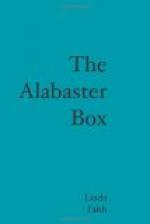There existed in Brookville two separate and distinct forums for the discussion of topics of public and private interest. These were the barroom of the village tavern, known as the Brookville House, and Henry Daggett’s General Store, located on the corner opposite the old Bolton Bank Building. Mr. Daggett, besides being Brookville’s leading merchant, was also postmaster, and twice each day withdrew to the official privacy of the office for the transaction of United States business. The post office was conveniently located in one corner of Mr. Daggett’s store and presented to the inquiring eye a small glass window, which could be raised and lowered at will by the person behind the partition, a few numbered boxes and a slit, marked “Letters.”
In the evening of the day on which Miss Lydia Orr had visited the old Bolton house in company with Deacon Whittle, both forums were in full blast. The wagon-shed behind the Brookville House sheltered an unusual number of “rigs,” whose owners, after partaking of liquid refreshment dispensed by the oily young man behind the bar, by common consent strolled out to the veranda where a row of battered wooden armchairs invited to reposeful consideration of the surprising events of the past few days.
The central chair supported the large presence of “Judge” Fulsom, who was dispensing both information and tobacco juice.
“The practice of the legal profession,” said the Judge, after a brief period devoted to the ruminative processes, “is full of surprises.”
Having spoken, Judge Fulsom folded his fat hands across the somewhat soiled expanse of his white waistcoat and relapsed into a weighty silence.
“They was sayin’ over to the post office this evening that the young woman that cleaned up the church fair has bought the old Bolton place. How about it, Jedge?”
Judge Fulsom grunted, as he leveled a displeased stare upon the speaker, a young farmer with a bibulous eye and slight swagger of defiance. At the proper moment, with the right audience, the Judge was willing to impart information with lavish generosity. But any attempt to force his hand was looked upon as a distinct infringement of his privilege.
“You want to keep your face shut, Lute, till th’ Jedge gets ready to talk,” counseled a middle-aged man who sat tilted back in the next chair. “Set down, son, and cool off.”
“Well, you see I got to hurry along,” objected the young farmer impatiently, “and I wanted to know if there was anything in it. Our folks had money in the old bank, an’ we’d give up getting anything more out the smash years ago. But if the Bolton place has actually been sold—”
He finished with a prolonged whistle.
The greatness in the middle chair emitted a grunt.
“Humph!” he muttered, and again, “Hr-m-m-ph!”
“It would be surprising,” conceded the middle-aged man, “after all these years.”
“Considerable many of th’ creditors has died since,” piped up a lean youth who was smoking a very large cigar. “I s’pose th’ children of all such would come in for their share—eh, Judge?”




